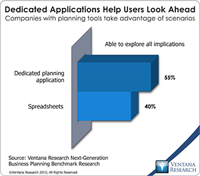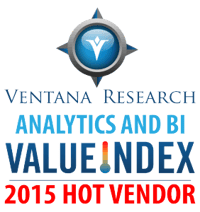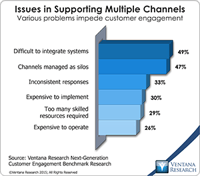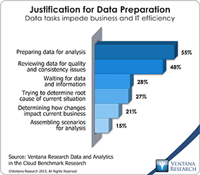We now are well beyond the year depicted in 2001: A Space Odyssey, a cinematic perspective on the future of artificial intelligence in which HAL 9000, a computer, is able to simulate human behavior and control machines. Anyone reviewing the past two years of marketing around AI in the business technology industry can be forgiven for believing that we have arrived at the futuristic state Stanley Kubrick imagined. We have not.
Read More
Topics:
Big Data,
Data Science,
Mobile,
Customer Analytics,
Customer Engagement,
Customer Experience,
Machine Learning,
Mobile Technology,
Wearable Computing,
business intelligence,
Analytics,
Cloud Computing,
Collaboration,
Customer Service,
Data Governance,
Data Integration,
Data Preparation,
Internet of Things,
Contact Center,
Information Optimization,
Digital Technology,
Machine Learning and Cognitive Computing,
Cybersecurity,
Billing and Recurring Revenue,
Workforce Optimization,
collaboration for business
Advancing the potential of any business requires continuous improvement in the processes and technology that support it. Many companies have embraced attempts at a digital transformation, and it’s become a goal to which organizational resources and budgets have been dedicated around the globe.
Read More
Topics:
Big Data,
Data Science,
Mobile,
Sales,
Customer Analytics,
Customer Engagement,
Customer Experience,
Human Capital Management,
Machine Learning,
Marketing,
Marketing Performance Management,
Mobile Technology,
Office of Finance,
Wearable Computing,
Analytics,
Business Intelligence,
Cloud Computing,
Collaboration,
Customer Service,
Data Governance,
Data Integration,
Data Preparation,
Internet of Things,
Contact Center,
Information Optimization,
Product Information Management,
Digital Technology,
Digital Marketing,
Digital Commerce,
Operations & Supply Chain,
Machine Learning and Cognitive Computing,
Pricing and Promotion Management,
Cybersecurity,
Billing and Recurring Revenue,
Workforce Optimization,
collaboration for business
Cloudera provides database and enabling technology for the big data market and overall for data and information management. As my colleague David Menninger has written, the big data and information management technology markets are changing rapidly and require vendors to adapt to them. Cloudera has grown significantly over the last decade and now has approximately 1,000 customers and provides support and services in countries around the world. Its product and technology strategy is to provide a...
Read More
Topics:
Big Data,
Data Science,
Machine Learning,
Analytics,
Business Intelligence,
Cloud Computing,
Data Governance,
Data Integration,
Data Preparation,
Internet of Things,
Cognitive Computing,
Information Optimization,
Digital Technology,
Cybersecurity
Organizations in all industries face various difficulties in managing product information. The most serious is providing complete, engaging information to consumers and customers on the internet. Newly developed products, mergers and acquisitions, changes to pricing and promotions in online commerce spur business growth, but these factors also increase the amount and complexity of product-related data and content. In addition the digital economy offers a new generation of services that are sold...
Read More
Topics:
Big Data,
Operational Performance Management (OPM),
PIM, Product Information Management, Sales, Market,
Business Analytics,
Cloud Computing,
Uncategorized,
Business Performance Management (BPM),
Customer Performance Management (CPM),
Financial Performance Management (FPM),
Information Management (IM),
Information Optimization,
Sales Performance Management (SPM),
Supply Chain Performance Management (SCPM)
Enterprise messaging is the technology backbone of communications for applications and systems within and between organizations. Both its importance and its complexity are growing as organizations increasingly have to provide real-time responses to business customers and consumers as well as their own business professionals who support them and their internal supply chains. The variety of use cases for enterprise messaging also is growing rapidly, expanding to the Internet of Things (IoT)...
Read More
Topics:
Big Data,
Social Media,
Enterprise messaging, Internet of Things, IoT, mid,
Operational Performance Management (OPM),
Cloud Computing,
Governance, Risk & Compliance (GRC),
Operational Intelligence,
Uncategorized,
Business Performance Management (BPM),
Customer Performance Management (CPM),
Information Management (IM),
Information Optimization,
Supply Chain Performance Management (SCPM)
I hope this title captures your attention; I’m trying to make a point about the chaos going on in managing and operating marketing. What marketing needs in 2016 is to manage and optimize its efforts in a more unified manner. This perspective kicks off a new series on the challenges for marketing to automate or execute tasks and manage toward maximum performance. We all know that the craft of marketing is in need of significant transformation, from the CMO throughout the entire marketing...
Read More
Topics:
Big Data,
Predictive Analytics,
Social Media,
Operational Performance Management (OPM),
Business Analytics,
Business Collaboration,
Business Intelligence,
Cloud Computing,
Location Intelligence,
Operational Intelligence,
Uncategorized,
Business Performance Management (BPM),
CMO,
Customer Performance Management (CPM),
Financial Performance Management (FPM),
Information Applications (IA),
Information Optimization,
Sales Performance Management (SPM)
At the 2015 technology analyst summit in Austin, Texas, analytics and business intelligence software vendor Qlik discussed recent market and product developments and explained its roadmap and strategy for 2016. Discussion topics included its Qlik Analytics Platform and QlikView 12.0, Qlik Sense and Qlik DataMarket, applications built on the platform but also how it is expanding its analytics experience for business.
Read More
Topics:
Big Data,
Business Analytics,
Business Intelligence,
Governance, Risk & Compliance (GRC),
Operational Intelligence,
Uncategorized,
Business Performance Management (BPM),
Information Management (IM),
Information Optimization
Stibo Systems has been providing product information management (PIM) software for decades. Its work has helped many organizations worldwide take control of their product information by developing a master definition that can be published acrossmany channels from Web to digital to print. We recognized its work with customers Delta Faucet and Masco Corp. in our 2015 Ventana Research Leadership Award in Information Management. In 2014 Stibo Systems customer Brady Corp. won a similar award for...
Read More
Topics:
Big Data,
Master Data Management,
MDM,
Operational Performance Management (OPM),
PIM,
Stibo Systems,
Cloud Computing,
Business Performance Management (BPM),
Customer Performance Management (CPM),
Financial Performance Management (FPM),
Information Management (IM),
Information Optimization,
Product Information Management,
Sales Performance Management (SPM),
Supply Chain Performance Management (SCPM)
This has been a dramatic year for Informatica, a major provider of data integration software. In August it was acquired and taken private by Permira funds and Canada Pension Plan Investment Board for about US$5.3 billion. This change was accompanied by shifts in its management. CEO Sohaib Abbasi became chairman and now has left, and many executives were replaced while Anil Chakravathy became CEO from being the Chief Product Officer. The new owners appear to have shifted the company’s strategic...
Read More
Topics:
Big Data,
Data Quality,
Master Data Management,
MDM,
Operational Performance Management (OPM),
Cloud Computing,
Data Integration,
Data Management,
Data Preparation,
Governance, Risk & Compliance (GRC),
Informatica,
Uncategorized,
Business Performance Management (BPM),
Information Management (IM),
Information Optimization,
Risk & Compliance (GRC)
The need for businesses to process and analyze data has grown in intensity along with the volumes of data they are amassing. Our benchmark research consistently shows that preparing data is the most widespread impediment to analytic and operational efficiency. In our recent research on data and analytics in the cloud, more than half (55%) of organizations said that preparing data for analysis is a major impediment, followed by other preparatory tasks: reviewing data for quality and consistency...
Read More
Topics:
Big Data,
Human Capital,
Marketing,
Monarch,
Operational Performance Management (OPM),
Business Analytics,
Business Intelligence,
Data Preparation,
Governance, Risk & Compliance (GRC),
Uncategorized,
Business Performance Management (BPM),
Customer Performance Management (CPM),
Datawatch,
Financial Performance Management (FPM),
Information Management (IM),
Information Optimization,
Sales Performance Management (SPM),
Supply Chain Performance Management (SCPM)




















